Ed Gorman's Blog, page 24
September 1, 2015
Pro-File Phoef Sutton Brash Books
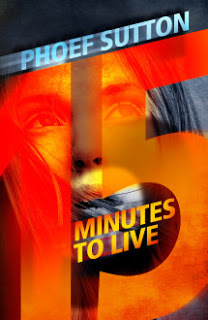 Phoef Sutton is the Emmy and WGA award winning writer of shows like CHEERS and BOSTON LEGAL. He's had three books out so far in 2015: FIFTEEN MINUTES TO LIVE from Brash Books, WICKED CHARMS co-authored with Janet Evanovich, and CRUSH from Prospect Park. He may still have one more book released before the year is out!
Phoef Sutton is the Emmy and WGA award winning writer of shows like CHEERS and BOSTON LEGAL. He's had three books out so far in 2015: FIFTEEN MINUTES TO LIVE from Brash Books, WICKED CHARMS co-authored with Janet Evanovich, and CRUSH from Prospect Park. He may still have one more book released before the year is out!1. Tell us about your current novel. I currently have three novels out. FIFTEEN MINUTES TO LIVE, published by Brash Books, is a re-print of my first novel. WICKED CHARMS, co-authored with Janet Evanovich and published by Bantam, is supernatural romp. CRUSH, published by Prospect Park Books, is about a nightclub bouncer and bodyguard in present-day Los Angeles. It features hard action and a lot of humor. This is my humble attempt to write a Travis McGee, though I’m embarrassed to even say that out loud.
.2. Can you give a sense of what you're working on now? I’m working a sequel to my last novel and a sequel to the novel I wrote before that. Sequels have their own pitfalls. Reintroducing characters in a new way but not repeating yourself? Very difficult. Telling a story that’s like the original but new? Ditto. This is new territory for me. In television they always say you should think of the first six episode of a series as different versions of the pilot. I suppose it’s something like that.
3. What is the greatest pleasure of a writing career? Writing. I love the act of writing. I love being lost in the story, getting to know the characters. It is one of the few times when I am truly “in the moment.”
4. What is the greatest DISpleasure? Pitching. Pitching my work before I’ve written it. I can’t stand it. I’m not a salesman, I’m a writer.
5. If you have one piece of advice for the publishing world, what is it? I’m still learning the ropes. There’s no way I can give advice.
6. Are there two or three forgotten mystery writers you'd like to see
in print again? Richard Prather; the author of the delightfully brash Shell Scott novels. Leigh Brackett; the writer and that everybody knows and nobody knows. As a screenwriter, she wrote everything from THE BIG SLEEP to THE EMPIRE STRIKES BACK. She was a successful science fiction novelist and fine mystery writer. Robert Arthur, Jr; wrote fine mystery stories for Alfred Hitchcock as well as The Three Investigator kids novels and The Mysterious Traveller radio series. Worthy of rediscovery.
7. Tell us about selling your first novel. Most writers never forget
that moment. Like everything in life, it was mixture of highs and lows. I’d written my first novel, ALWAYS SIX O’CLOCK as an experiment. To see if I could it. I sent to my friends, asked them what they thought. My lawyer, for one, loved it. He sent it out to agents. One of them called me back. She wanted to handle it. She sent it out. We heard from a couple of people. One was a small the publishing house, who loved it. One was a big publishing house, who thought it needed work but wanted to buy it. I couldn’t believe my good fortune. The big publishing house offered considerable more money and prestige. So I went with them. Big mistake. After the celebration, they got me to change the book, to take out what was special about it, to water it down. It was published and sank without a trace. I learned a lot from that experience. Don’t chase the money and the prestige. Go with the people who understand your work. I was finally able to put out my original version of the novel, now titled FIFTEEN MINUTES TO LIVE, when Brash Books offered to publish it. It feels great to have the real McCoy available at last.
Published on September 01, 2015 12:33
August 31, 2015
Mel Odom Reviews Cast in Dark Waters by Gorman-Piccirilli
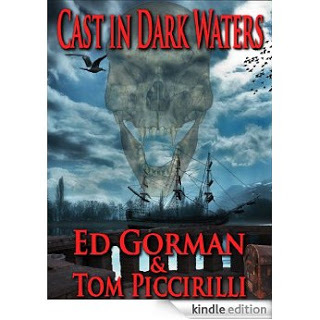
Now only $3.99 on Kindle
5.0 out of 5 stars Wonderful Pulp 12 May 2011By Mel Odom - Published on Amazon.comFormat:Kindle Edition|Verified PurchaseThis jim-dandy little novella is just begging for a sequel, and I don't want to be kept waiting. Cast in Dark Waters seems like it just came out of nowhere, but it has a history as a limited release hardcover book from Subterranean. I missed it then, but I'm glad I caught up with it now.
This is old-school pulp writing, folks, and it reads like something that would have come from the typewriter of Robert E. Howard or one of his contemporaries. The story is set in the Caribbean in the 16th century and feels like a pirate movie from the heyday of when Hollywood did them big and did them right. I love the current Pirates of the Caribbean stuff that's going on now, but I still remember watching Errol Flynn in The Sea Hawk and being blown away.
The opening of the story is immediately intriguing, but it's the female sea captain, Crimson, that steps onto center stage and owns the show. She comes in swinging, too, in a wild bar brawl that is a sheer pleasure to read and made me feel all of ten years old again discovering the pulp stories that shaped me into the man I am now. Growing up in southeastern Oklahoma meant there was a lot of cowboys architecture in my male role models, but thanks to the reading material I had at hand there was a lot of pirates, private eyes, and science fiction as well.
The relationship Crimson has with her father (although no one dares suggest to either of them that they're related) is at once absorbing. Tangled relationships are great fiction fodder, and the one between Crimson and Welsh is a great one.
But Gorman and Piccirilli don't stop there. Crimson's husband, Tyree, has gone missing on the island of Benbow, which is believed to be the home to nightmares and bloodsuckers. In this first story, we think we know what the truth is, but we don't receive the final answer. And in that, the authors have us snared. I hope to see a sequel soon.
The seafaring action and the fights on the island are very well done. I felt like I was staying in step with Lady Crimson when she set sail and when she set foot on the island. The mythology of the things she's hunting is very well laid out and I enjoyed the "almost knowing" everything that was involved. After all 16th century pirates don't know everything we know these days.
The atmosphere is very well done and the Caribbean landscape and the lifestyle of a pirate are marked on every page. The authors did some good research and blend it seamlessly into their pirate-horror-adventure concoction.
blend it seamlessly into their pirate-horror-adventure concoction.
Published on August 31, 2015 14:16
Mel Odom Review Cast in Dark Waters by Gorman-Piccirilli

Now only $3.99 on Kindle
5.0 out of 5 stars Wonderful Pulp 12 May 2011By Mel Odom - Published on Amazon.comFormat:Kindle Edition|Verified PurchaseThis jim-dandy little novella is just begging for a sequel, and I don't want to be kept waiting. Cast in Dark Waters seems like it just came out of nowhere, but it has a history as a limited release hardcover book from Subterranean. I missed it then, but I'm glad I caught up with it now.
This is old-school pulp writing, folks, and it reads like something that would have come from the typewriter of Robert E. Howard or one of his contemporaries. The story is set in the Caribbean in the 16th century and feels like a pirate movie from the heyday of when Hollywood did them big and did them right. I love the current Pirates of the Caribbean stuff that's going on now, but I still remember watching Errol Flynn in The Sea Hawk and being blown away.
The opening of the story is immediately intriguing, but it's the female sea captain, Crimson, that steps onto center stage and owns the show. She comes in swinging, too, in a wild bar brawl that is a sheer pleasure to read and made me feel all of ten years old again discovering the pulp stories that shaped me into the man I am now. Growing up in southeastern Oklahoma meant there was a lot of cowboys architecture in my male role models, but thanks to the reading material I had at hand there was a lot of pirates, private eyes, and science fiction as well.
The relationship Crimson has with her father (although no one dares suggest to either of them that they're related) is at once absorbing. Tangled relationships are great fiction fodder, and the one between Crimson and Welsh is a great one.
But Gorman and Piccirilli don't stop there. Crimson's husband, Tyree, has gone missing on the island of Benbow, which is believed to be the home to nightmares and bloodsuckers. In this first story, we think we know what the truth is, but we don't receive the final answer. And in that, the authors have us snared. I hope to see a sequel soon.
The seafaring action and the fights on the island are very well done. I felt like I was staying in step with Lady Crimson when she set sail and when she set foot on the island. The mythology of the things she's hunting is very well laid out and I enjoyed the "almost knowing" everything that was involved. After all 16th century pirates don't know everything we know these days.
The atmosphere is very well done and the Caribbean landscape and the lifestyle of a pirate are marked on every page. The authors did some good research and blend it seamlessly into their pirate-horror-adventure concoction.
blend it seamlessly into their pirate-horror-adventure concoction.
Published on August 31, 2015 14:15
The great site Vulture does very well by the great Wes Craven
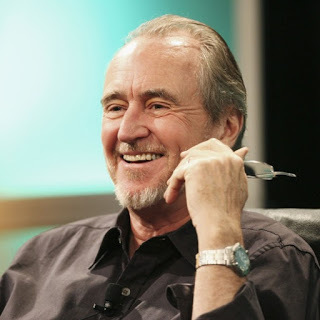 WBetween Screams, Craven notably ventured into non-horror territory with the Meryl Streep–starring Music of the Heart, about a music teacher who worked with underprivileged schoolchildren in Harlem. "We had a very difficult time getting an audience into a theater on my name," he said of the film, according to THR. "In fact, we moved toward downplaying my name a lot on Music of the Heart. The more famous you are for making kinds of outrageous scary films, the crossover audience will say, 'I don't think so.'" Streep, however, received a Best Actress Oscar nom for her work with him on the film. Craven's most popular original works — especially Scream, The Hills Have Eyes, and The Last House on the Left — have been reimagined as reboots and remakes for new generations of viewers. His most recent finished flicks include 2010's My Soul to Take and 2011's Scream 4. Before his death, Craven was executive-producing MTV's new Scream series reboot; he had also reportedly written the Thou Shalt Not Kill portion of the Weinstein Co.'s forthcoming Ten Commandments miniseries. (You can peruse the entirety of his extensive filmography This story has been updated throughout.
WBetween Screams, Craven notably ventured into non-horror territory with the Meryl Streep–starring Music of the Heart, about a music teacher who worked with underprivileged schoolchildren in Harlem. "We had a very difficult time getting an audience into a theater on my name," he said of the film, according to THR. "In fact, we moved toward downplaying my name a lot on Music of the Heart. The more famous you are for making kinds of outrageous scary films, the crossover audience will say, 'I don't think so.'" Streep, however, received a Best Actress Oscar nom for her work with him on the film. Craven's most popular original works — especially Scream, The Hills Have Eyes, and The Last House on the Left — have been reimagined as reboots and remakes for new generations of viewers. His most recent finished flicks include 2010's My Soul to Take and 2011's Scream 4. Before his death, Craven was executive-producing MTV's new Scream series reboot; he had also reportedly written the Thou Shalt Not Kill portion of the Weinstein Co.'s forthcoming Ten Commandments miniseries. (You can peruse the entirety of his extensive filmography This story has been updated throughout.
Published on August 31, 2015 08:36
August 30, 2015
In Conversation With Quentin Tarantino from Vulture-
For the entire interview go here:
http://www.vulture.com/2015/08/quenti...
We’re five months from the release of The Hateful Eight. How close to finishing are you?We’ve got a little bit more than an hour finished right now. I just got back from seeing an hour of the movie cut together.Are you happy with it?I’m not committing suicide yet. It is what it is. We’re rushing and trying to get to the end. Then you go through it and try to make it even better. But first, you just get to the end.Every movie I’ve ever done, there has always been some date we were trying to meet, whether it was with Reservoir Dogs, trying to meet the Sundance date, or Pulp Fiction, meeting the Cannes date. But we always pull it off. And this way you don’t have that situation where you finish the movie and then the people who paid to make it get to sit around and pick it to death. So you don’t get notes from the studio anymore?No, you do. Oh, yeah.1Is it different now, coming off Django Unchained and Inglourious Basterds ? Those were the biggest hits of your career.
2 Did that box office change things?I don’t think so, as far as me making the story I want to tell. But I learned a big lesson with Grindhouse,3 and I try not to repeat the mistake. Robert Rodriguez and I had gotten used to going our own way, on these weird roads, and having the audience come along. We’d started thinking they’d go wherever we wanted. With Grindhouse, that proved not to be the case. It was still worth doing, but it would have been better if we weren’t caught so unaware by how uninterested people were.You’ve talked at various times about how, when you’re directing, you like to play your audience like a conductor does an orchestra. As time goes on and audiences become more sophisticated and accustomed to your style, does that become harder?
Frankly, sophisticated audiences are not a problem. Dumb audiences are a problem. But I think audiences are getting more sophisticated — that’s just a product of time. In the ’50s, audiences accepted a level of artifice that the audiences in 1966 would chuckle at. And the audiences of 1978 would chuckle at what the audience of 1966 said was okay, too. The trick is to try to be way ahead of that curve, so they’re not chuckling at your movies 20 years down the line. With Pulp Fiction,people were like, “Wow, I have never seen a movie like that before. A movie can do that?” I don’t think that’s the case anymore. I’m not talking ridiculously over anyone’s head anymore. I think people watched Djangoand Inglourious Basterds and thought they were really out there, but they got it. They felt themselves on solid ground. It wasn’t just, “What the fuck was that?” And people understand what I’m doing with genre. They’re not befuddled. They don’t think I’m doing it wrong. They get it. Speaking of genre, what is it about the Western for you? There aren’t many being made right now.There are a few coming out. Antoine Fuqua is doing Magnificent Seven,starring Denzel Washington, so that’s one. Django did so well I’m surprised that there’s not even more.One thing that’s always been true is that there’s no real film genre that better reflects the values and the problems of a given decade than the Westerns made during that specific decade. The Westerns of the ’50s reflected Eisenhower America better than any other films of the day. The Westerns of the ’30s reflected the ’30s ideal. And actually, the Westerns of the ’40s did, too, because there was a whole strain of almost noirish Westerns that, all of a sudden, had dark themes. The ’70s Westerns were pretty much anti-myth Westerns — Watergate Westerns. Everything was about the anti-heroes, everything had a hippie mentality or a nihilistic mentality. Movies came out about Jesse James and the Minnesota raid, where Jesse James is a homicidal maniac. In Dirty Little Billy, Billy the Kid is portrayed as a cute little punk killer. Wyatt Earp is shown for who he is in the movie Doc, by Frank Perry. In the ’70s, it was about ripping the scabs off and showing who these people really were. Consequently, the big Western that came out in the ’80s was Silverado, which was trying to be rah-rah again — that was very much a Reagan Western.
Published on August 30, 2015 14:05
August 29, 2015
Parker as Parker: The Long Road to the Big Screen
Parker as Parker: The Long Road to the Big Screenfor the entire piece go herehttp://www.wordandfilm.com/2013/01/pa... Word and Filmby Valerie KalfrinJanuary 23, 2013
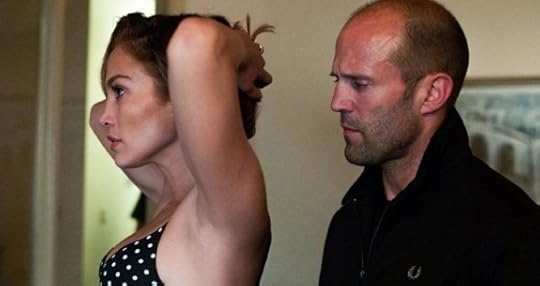
Jennifer Lopez and Jason Statham in ‘Parker’/Image © 2013 FilmDistrict
Richard Stark's Parker, the hard-bitten antihero of twenty-four crime novels, finally comes to the screen on January 25 under his own name. The film, "Parker," starring Jason Statham and Jennifer Lopez, is based on the 2011 novel Flashfire, a thrilling story in which the master criminal seeks revenge on the crew who double-crossed him and left him for dead. Oscar nominee Taylor Hackford of "Ray" fame directs this movie adaptation.Moviegoers have seen about a half-dozen earlier versions of Parker, none of them eponymous. Creator Donald E. Westlake (writing under the name Richard Stark) didn’t want to use the character’s name in a film unless the filmmakers agreed to produce the books as a series, according to Paul Westlake, the late author’s youngest son and caretaker of his dad’s website. The new film’s production company purchased the rights to multiple books.British action star Statham might seem an odd choice for this “definitively American character,” but his “subdued mannerisms,” low-key performance, and efficiency in the action scenes are a good fit, Paul Westlake writes. He continues, “Overall, this is an excellent first installment of what we hope will become a successful introduction of Parker to a larger audience.”The Parker novels are but a small part of Donald E. Westlake’s illustrious career. This Grand Master of the Mystery Writers of America penned more than 100 novels and short stories, as well as screenplays. Here’s a look at some of his forays into film."Point Blank" (1967)
Based on the first Parker novel, The Hunter, this film casts Lee Marvin (here called Walker) as the criminal aiming to recoup money his cohorts stole from him. Angie Dickinson co-stars, providing sexy backup. The same book was the basis for 1999's "Payback," starring Mel Gibson (as a vengeful character named Porter) and Maria Bello. Brian Helgeland's "Payback: Straight Up – The Director’s Cut" had a limited theatrical release in 2006."The Split" (1968)
This adaptation of the Parker novel The Seventh casts Jim Brown (here called McClain) as a thief after his share of the heist during a football game at the Los Angeles Coliseum."The Hot Rock" (1972)
Robert Redford portrays Westlake’s other popular creation, John Dortmunder -- a thief whose capers comically tend to collapse -- in this adaptation of the novel of the same name. Here, Dortmunder and his cohorts (including George Segal) repeatedly attempt to steal a diamond that keeps eluding them."Cops And Robbers" (1973)
Westlake wrote the screenplay for this film, adapting his comic crime novel of the same name. Cliff Gorman and Joseph Bologna play two New York City cops who encounter one mishap after another while trying to steal $10 million to supplement their pensions."The Outfit" (1973)
Robert Duvall stars in this adaptation of the novel of the same name, featuring the Parker character (here called Macklin) hitting the mob on its own turf."Hot Stuff" (1979)
Westlake co-wrote the original screenplay for this comedy about three cops -- played by Dom DeLuise, Suzanne Pleshette, and Jerry Reed -- who establish a pawn-shop sting operation.
Published on August 29, 2015 19:16
August 28, 2015
Brash Books: Pro-File with Philip Reed OFF AND RUNNING
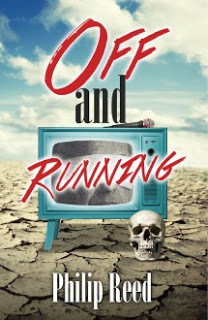
1. I like to call Off and Running a California caper because it goes from the Hollywood Hills, to Pebble Beach, to the Sierra and ends in Death Valley. A journalist gets a big break when he is chosen to write the autobiography of a television icon from the 60s, only to have his subject suffer a stroke, leaving everyone at the mercy of the famous man's psychopathic son.
2. I have two half-finished thrillers, one is a sequel to my horse racing thriller The Marquis de Fraud, and the other is a story of corporate embezzlement called The Fraud Triangle. I also have several non-fiction projects about golf and blackjack. And I'm working a day job as an editor at the automotive site Edmunds.com.
3. It's a great joy when I find I am connecting with readers. All too often, I wonder if people will get it, will understand and participate in what I write. Often, I find that readers are far more perceptive than I imagine. They get it, and they find things I never realized were there.
The other thing I like is coaxing an idea out of the vagueness of my mind. It's interesting how it slowly defines and reveals itself.
4. The greatest displeasure is how hard it is to attract new readers and how the trend seems to be away from reading.
5. My advice is this: don't give up on books. Reading is a singular pleasure that the world needs. Rading does something to our brains that is very good for us.
6. There are many great forgotten writers, myself included. One writer I really admire, and who was kind and encouraging, is Rex Burns.
7. I sold Bird Dog with the help of a wonderful NY agent, John Hawkins whose agency had once represented Jack London. He was everything I ever imagined an agent would be. He got me a two-book deal in three days, then doubled the original offer over the next few days. Bird Dog was published by Pocket Books. I then worked with a wonderful editor, Dudley Frasier, who had known all the great writers of the 50s and 60s.
Philip Reed is a former police reporter who turned to writing mysteries, non-fiction books, plays and screenplays. His latest novel, Off & Running, coming from Brash Books in 2015, is a darkly funny thriller about a desperate biographer who kidnaps his celebrity subject. We can only wonder how much of the novel was inspired by Reed’s experience writing his first book, Candidly Allen Funt, an autobiography of the 1960s TV legend.Reed’s first novel, the “car noir” thriller, Bird Dog, was nominated for the Edgar and Anthony awards and optioned by Hollywood seven times. His many other books include Low Rider, Marquis de Fraud, Free Throw, and In Search of the Greatest Golf Swing. He is currently at work writing A Piece of the Action, a non-fiction account of a year spent playing blackjack in casinos across the country with a professional card counter. He lives in Long Beach, California and is an editor at Edmunds.com.
Published on August 28, 2015 14:05
Brash Books-Pro-File with Philip Reed

1. I like to call Off and Running a California caper because it goes from the Hollywood Hills, to Pebble Beach, to the Sierra and ends in Death Valley. A journalist gets a big break when he is chosen to write the autobiography of a television icon from the 60s, only to have his subject suffer a stroke, leaving everyone at the mercy of the famous man's psychopathic son.
2. I have two half-finished thrillers, one is a sequel to my horse racing thriller The Marquis de Fraud, and the other is a story of corporate embezzlement called The Fraud Triangle. I also have several non-fiction projects about golf and blackjack. And I'm working a day job as an editor at the automotive site Edmunds.com.
3. It's a great joy when I find I am connecting with readers. All too often, I wonder if people will get it, will understand and participate in what I write. Often, I find that readers are far more perceptive than I imagine. They get it, and they find things I never realized were there.
The other thing I like is coaxing an idea out of the vagueness of my mind. It's interesting how it slowly defines and reveals itself.
4. The greatest displeasure is how hard it is to attract new readers and how the trend seems to be away from reading.
5. My advice is this: don't give up on books. Reading is a singular pleasure that the world needs. Rading does something to our brains that is very good for us.
6. There are many great forgotten writers, myself included. One writer I really admire, and who was kind and encouraging, is Rex Burns.
7. I sold Bird Dog with the help of a wonderful NY agent, John Hawkins whose agency had once represented Jack London. He was everything I ever imagined an agent would be. He got me a two-book deal in three days, then doubled the original offer over the next few days. Bird Dog was published by Pocket Books. I then worked with a wonderful editor, Dudley Frasier, who had known all the great writers of the 50s and 60s.
Philip Reed is a former police reporter who turned to writing mysteries, non-fiction books, plays and screenplays. His latest novel, Off & Running, coming from Brash Books in 2015, is a darkly funny thriller about a desperate biographer who kidnaps his celebrity subject. We can only wonder how much of the novel was inspired by Reed’s experience writing his first book, Candidly Allen Funt, an autobiography of the 1960s TV legend.Reed’s first novel, the “car noir” thriller, Bird Dog, was nominated for the Edgar and Anthony awards and optioned by Hollywood seven times. His many other books include Low Rider, Marquis de Fraud, Free Throw, and In Search of the Greatest Golf Swing. He is currently at work writing A Piece of the Action, a non-fiction account of a year spent playing blackjack in casinos across the country with a professional card counter. He lives in Long Beach, California and is an editor at Edmunds.com.
Published on August 28, 2015 14:04
Publisher’s Note: Writing Like the Wind
Publisher’s Note: Writing Like the Windby Allyson Longueira | Aug 24, 2015 | blog, Publisher's Note | 0 comments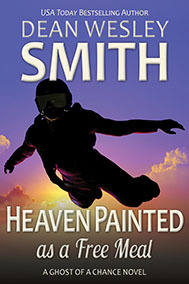 Bestselling author Dean Wesley Smith has been busy. Very busy. His fans will not find this statement the least bit shocking. And I have oh so many things to tell you about.First off is Dean’s latest Ghost of a Chance novel, Heaven Painted as a Free Meal, which officially publishes tomorrow. This is Dean’s third novel in that series, which mixes superheroes, ghosts, urban fantasy, and a whole lot of fun.Here’s the synopsis:Poker Boy and his team have saved the world countless times. The Ghost of a Chance agency follows a similar charge. Superheroes and ghosts, all working for the greater good.But as two new members join the Ghost of a Chance team, both ghosts and superheroes face a challenge that threatens to end the world.
Bestselling author Dean Wesley Smith has been busy. Very busy. His fans will not find this statement the least bit shocking. And I have oh so many things to tell you about.First off is Dean’s latest Ghost of a Chance novel, Heaven Painted as a Free Meal, which officially publishes tomorrow. This is Dean’s third novel in that series, which mixes superheroes, ghosts, urban fantasy, and a whole lot of fun.Here’s the synopsis:Poker Boy and his team have saved the world countless times. The Ghost of a Chance agency follows a similar charge. Superheroes and ghosts, all working for the greater good.But as two new members join the Ghost of a Chance team, both ghosts and superheroes face a challenge that threatens to end the world.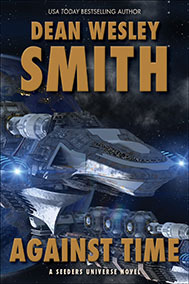 The Ghost Agents, including newly dead recruit Elliot and almost dead Deanna, team up with Poker Boy and his team to save the living.Amazing Stories calls the Poker Boy series “unlike anything else out there. It’s quirky and a lot of fun.”If you’re looking for an entertaining book to read as the last days of summer draw to a close, pick this one up.And if you follow Dean’s blog, you know that he spent all of last month writing a short story a day. Well, that project, called Stories from July, is now in my hands, and I’ll be publishing the entire collection, including Dean’s blog posts about writing those stories, in September. So, stay tuned for more information on that.
The Ghost Agents, including newly dead recruit Elliot and almost dead Deanna, team up with Poker Boy and his team to save the living.Amazing Stories calls the Poker Boy series “unlike anything else out there. It’s quirky and a lot of fun.”If you’re looking for an entertaining book to read as the last days of summer draw to a close, pick this one up.And if you follow Dean’s blog, you know that he spent all of last month writing a short story a day. Well, that project, called Stories from July, is now in my hands, and I’ll be publishing the entire collection, including Dean’s blog posts about writing those stories, in September. So, stay tuned for more information on that.
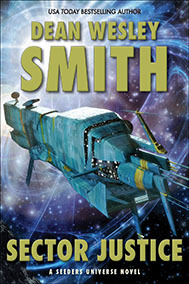 But I have to say publicly, wow, Dean, wow. Thirty-two stories in thirty-one days. Plus, he created two brand new series. I can’t emphasize enough to you readers how impressive that is. If you aren’t following Dean’s blog, you really should check it out. You can find it here.And finally, Dean’s galaxy-spanning Seeders Universe novels have gotten a brand-new look. If you follow this blog, you know I’ve been busy with rebranding projects, and this series is the latest. I’m very pleased with how they’ve turned out. So, if you haven’t started the series yet, now’s the time. You can read more about each of the books by clicking on the covers.So, projects, projects and more projects. The busier Dean gets, the busier I do. And I wouldn’t have it any other way.
But I have to say publicly, wow, Dean, wow. Thirty-two stories in thirty-one days. Plus, he created two brand new series. I can’t emphasize enough to you readers how impressive that is. If you aren’t following Dean’s blog, you really should check it out. You can find it here.And finally, Dean’s galaxy-spanning Seeders Universe novels have gotten a brand-new look. If you follow this blog, you know I’ve been busy with rebranding projects, and this series is the latest. I’m very pleased with how they’ve turned out. So, if you haven’t started the series yet, now’s the time. You can read more about each of the books by clicking on the covers.So, projects, projects and more projects. The busier Dean gets, the busier I do. And I wouldn’t have it any other way.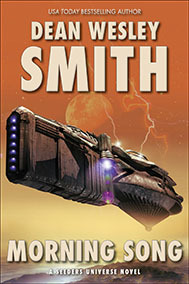 Allyson Longueira is publisher of WMG Publishing. She is an award-winning writer, editor and designer.
Allyson Longueira is publisher of WMG Publishing. She is an award-winning writer, editor and designer.
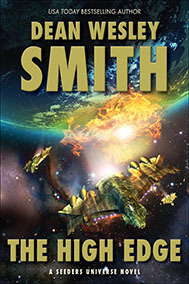
Submit a CommentYour email address will not be published. Required fields are marked *You may use these HTML tags and attributes: <a href="http://newimprovedgorman.blogspot.com..." title=""> <abbr title=""> <acronym title=""> <b> <blockquote cite=""> <cite> <code> <del datetime=""> <em> <i> <q cite=""> <s> <strike> <strong>
 Bestselling author Dean Wesley Smith has been busy. Very busy. His fans will not find this statement the least bit shocking. And I have oh so many things to tell you about.First off is Dean’s latest Ghost of a Chance novel, Heaven Painted as a Free Meal, which officially publishes tomorrow. This is Dean’s third novel in that series, which mixes superheroes, ghosts, urban fantasy, and a whole lot of fun.Here’s the synopsis:Poker Boy and his team have saved the world countless times. The Ghost of a Chance agency follows a similar charge. Superheroes and ghosts, all working for the greater good.But as two new members join the Ghost of a Chance team, both ghosts and superheroes face a challenge that threatens to end the world.
Bestselling author Dean Wesley Smith has been busy. Very busy. His fans will not find this statement the least bit shocking. And I have oh so many things to tell you about.First off is Dean’s latest Ghost of a Chance novel, Heaven Painted as a Free Meal, which officially publishes tomorrow. This is Dean’s third novel in that series, which mixes superheroes, ghosts, urban fantasy, and a whole lot of fun.Here’s the synopsis:Poker Boy and his team have saved the world countless times. The Ghost of a Chance agency follows a similar charge. Superheroes and ghosts, all working for the greater good.But as two new members join the Ghost of a Chance team, both ghosts and superheroes face a challenge that threatens to end the world. The Ghost Agents, including newly dead recruit Elliot and almost dead Deanna, team up with Poker Boy and his team to save the living.Amazing Stories calls the Poker Boy series “unlike anything else out there. It’s quirky and a lot of fun.”If you’re looking for an entertaining book to read as the last days of summer draw to a close, pick this one up.And if you follow Dean’s blog, you know that he spent all of last month writing a short story a day. Well, that project, called Stories from July, is now in my hands, and I’ll be publishing the entire collection, including Dean’s blog posts about writing those stories, in September. So, stay tuned for more information on that.
The Ghost Agents, including newly dead recruit Elliot and almost dead Deanna, team up with Poker Boy and his team to save the living.Amazing Stories calls the Poker Boy series “unlike anything else out there. It’s quirky and a lot of fun.”If you’re looking for an entertaining book to read as the last days of summer draw to a close, pick this one up.And if you follow Dean’s blog, you know that he spent all of last month writing a short story a day. Well, that project, called Stories from July, is now in my hands, and I’ll be publishing the entire collection, including Dean’s blog posts about writing those stories, in September. So, stay tuned for more information on that.
 But I have to say publicly, wow, Dean, wow. Thirty-two stories in thirty-one days. Plus, he created two brand new series. I can’t emphasize enough to you readers how impressive that is. If you aren’t following Dean’s blog, you really should check it out. You can find it here.And finally, Dean’s galaxy-spanning Seeders Universe novels have gotten a brand-new look. If you follow this blog, you know I’ve been busy with rebranding projects, and this series is the latest. I’m very pleased with how they’ve turned out. So, if you haven’t started the series yet, now’s the time. You can read more about each of the books by clicking on the covers.So, projects, projects and more projects. The busier Dean gets, the busier I do. And I wouldn’t have it any other way.
But I have to say publicly, wow, Dean, wow. Thirty-two stories in thirty-one days. Plus, he created two brand new series. I can’t emphasize enough to you readers how impressive that is. If you aren’t following Dean’s blog, you really should check it out. You can find it here.And finally, Dean’s galaxy-spanning Seeders Universe novels have gotten a brand-new look. If you follow this blog, you know I’ve been busy with rebranding projects, and this series is the latest. I’m very pleased with how they’ve turned out. So, if you haven’t started the series yet, now’s the time. You can read more about each of the books by clicking on the covers.So, projects, projects and more projects. The busier Dean gets, the busier I do. And I wouldn’t have it any other way. Allyson Longueira is publisher of WMG Publishing. She is an award-winning writer, editor and designer.
Allyson Longueira is publisher of WMG Publishing. She is an award-winning writer, editor and designer.
Submit a CommentYour email address will not be published. Required fields are marked *You may use these HTML tags and attributes: <a href="http://newimprovedgorman.blogspot.com..." title=""> <abbr title=""> <acronym title=""> <b> <blockquote cite=""> <cite> <code> <del datetime=""> <em> <i> <q cite=""> <s> <strike> <strong>
Published on August 28, 2015 05:50
August 27, 2015
Forgotten Books: The Pat Hobby Stories by F. Scott Fitzgerald
THURSDAY, AUGUST 27, 2015
My formative years were the Fifties. The films that influenced me the most were the noirs my father took me to and such fare as The Sweet Smell of Success and A Face in the Crowd. No heroes there. The same for my preferred reading (in additon to the Gold Medals and sf)--Hemingway, James Jones, Irwin Shaw (short stories), Graham Greene and Richard Wright among others. No heroes there either. Same for theater (I was writing terrible plays early on). O'Neill, Miller, Williams. Not a hero in sight.
We call a good deal of crime fiction dark. But is it? Cops replaced cowboys and now we have Cops (or investigators of any kind) with Personal Problems and reviewers think this is some kind of dangerous fiction. Not to me.
The constraints of commercial fiction are such that you risk losing a sale if your protagoist is an outright loser. The Brits were way ahead of us Yanks. Derek Raymond has spawned two generations of daring writers. The first time I read him I was struck by how much the texture of his prose reminded me of one of my five favorite books of all time, Down and Out in Paris and London by George Orwell. I read fifty pages of it the other day. What with globalization the world is once again as Orwell described it in the Thirties.
The literary writer Brian Moore (who started out writing Gold Medals and Dell originals under three different names) made a brief early career out of losers. The Lucky Of Ginger Coffee, for only one example, is about a daydreamer most people love but who is ultimately a selfish man whose daydreams are destroying his wife and children. He can't accept that he's an average guy--a loserbyhis lights. And that turns him into a dark loser indeed.
F. Scott Fitzgerald's work is filled with losers. Handsome, poetic ones, yes, but losers nonetheless. Winter Dreams, as one of his best stories is called, describes the near lifelong love of a man for woman he can never have. He has great business success but he is a loser because he can never have her. The last few pages will give you chills.
Here we have The Pat Hobby Stories. They are set in the Hollywood the late Thirties and feature a once prominent screeenwriter who is reduced to virtually begging for work at the various studios that once wined and dined him. The Fitzgerald myth is so tied to the notion of Romantic Loss that we forget that he was also funnier than hell. And causitc.
As Arnold Gingrich said shortly after Fitzgerald's death, "These stories were the last word from his last home, for much of what he felt about Hollywood and about himself permeated these stories."
And damned good stories they are, too. Not major Fitzgerald but cunning and crafty tales of bars, studios, whores of both genders, unhappy winners and drunken losers.
My favorite here is "Pat Hobby and Orson Welles." The luckless Hobby is hanging around the writer's building trying to cadge anything he can get--even a B-western--when somebody mentions Orson Welles. And Hobby almost loses it. Everywere he turns he hears about Orson Welles--newspaper, magazines, radio, movies. Orson Welles Orson Welles.
Fitzgerald uses Welles as a symbol of generational turn. Hobby and other men his age were major players in their time but now their time is gone. One studio head admits (reluctantly) to Hobby that he doesn't know what the hell all the fuss about Welles is either but dammit the young people on his staff swoon every time his name is mentioned. So this studio head and others push enormous sums of money on Welles. Hobby bitterly wonders why Welles doesn't stay in the East where he belongs---with the snobs. The West, dammit, is for common folk. (Well, except for the mansions and Rodeo Drive.)
This is a book filled with boozy grief, hilarious bitterness and a fascinating look from the inside as to what writers went through under the old studio management.
As Fitzgerald himself said, "This was not art, this was industry. (Who) you sat with at lunch was more important than what you (wrote) in your office."
A fine little collection.POSTED BY ED GORMAN AT 3:54 PM NO COMMENTS: LINKS TO THIS POST
My formative years were the Fifties. The films that influenced me the most were the noirs my father took me to and such fare as The Sweet Smell of Success and A Face in the Crowd. No heroes there. The same for my preferred reading (in additon to the Gold Medals and sf)--Hemingway, James Jones, Irwin Shaw (short stories), Graham Greene and Richard Wright among others. No heroes there either. Same for theater (I was writing terrible plays early on). O'Neill, Miller, Williams. Not a hero in sight.
We call a good deal of crime fiction dark. But is it? Cops replaced cowboys and now we have Cops (or investigators of any kind) with Personal Problems and reviewers think this is some kind of dangerous fiction. Not to me.
The constraints of commercial fiction are such that you risk losing a sale if your protagoist is an outright loser. The Brits were way ahead of us Yanks. Derek Raymond has spawned two generations of daring writers. The first time I read him I was struck by how much the texture of his prose reminded me of one of my five favorite books of all time, Down and Out in Paris and London by George Orwell. I read fifty pages of it the other day. What with globalization the world is once again as Orwell described it in the Thirties.
The literary writer Brian Moore (who started out writing Gold Medals and Dell originals under three different names) made a brief early career out of losers. The Lucky Of Ginger Coffee, for only one example, is about a daydreamer most people love but who is ultimately a selfish man whose daydreams are destroying his wife and children. He can't accept that he's an average guy--a loserbyhis lights. And that turns him into a dark loser indeed.
F. Scott Fitzgerald's work is filled with losers. Handsome, poetic ones, yes, but losers nonetheless. Winter Dreams, as one of his best stories is called, describes the near lifelong love of a man for woman he can never have. He has great business success but he is a loser because he can never have her. The last few pages will give you chills.
Here we have The Pat Hobby Stories. They are set in the Hollywood the late Thirties and feature a once prominent screeenwriter who is reduced to virtually begging for work at the various studios that once wined and dined him. The Fitzgerald myth is so tied to the notion of Romantic Loss that we forget that he was also funnier than hell. And causitc.
As Arnold Gingrich said shortly after Fitzgerald's death, "These stories were the last word from his last home, for much of what he felt about Hollywood and about himself permeated these stories."
And damned good stories they are, too. Not major Fitzgerald but cunning and crafty tales of bars, studios, whores of both genders, unhappy winners and drunken losers.
My favorite here is "Pat Hobby and Orson Welles." The luckless Hobby is hanging around the writer's building trying to cadge anything he can get--even a B-western--when somebody mentions Orson Welles. And Hobby almost loses it. Everywere he turns he hears about Orson Welles--newspaper, magazines, radio, movies. Orson Welles Orson Welles.
Fitzgerald uses Welles as a symbol of generational turn. Hobby and other men his age were major players in their time but now their time is gone. One studio head admits (reluctantly) to Hobby that he doesn't know what the hell all the fuss about Welles is either but dammit the young people on his staff swoon every time his name is mentioned. So this studio head and others push enormous sums of money on Welles. Hobby bitterly wonders why Welles doesn't stay in the East where he belongs---with the snobs. The West, dammit, is for common folk. (Well, except for the mansions and Rodeo Drive.)
This is a book filled with boozy grief, hilarious bitterness and a fascinating look from the inside as to what writers went through under the old studio management.
As Fitzgerald himself said, "This was not art, this was industry. (Who) you sat with at lunch was more important than what you (wrote) in your office."
A fine little collection.POSTED BY ED GORMAN AT 3:54 PM NO COMMENTS: LINKS TO THIS POST

Published on August 27, 2015 17:54
Ed Gorman's Blog
- Ed Gorman's profile
- 118 followers
Ed Gorman isn't a Goodreads Author
(yet),
but they
do have a blog,
so here are some recent posts imported from
their feed.



